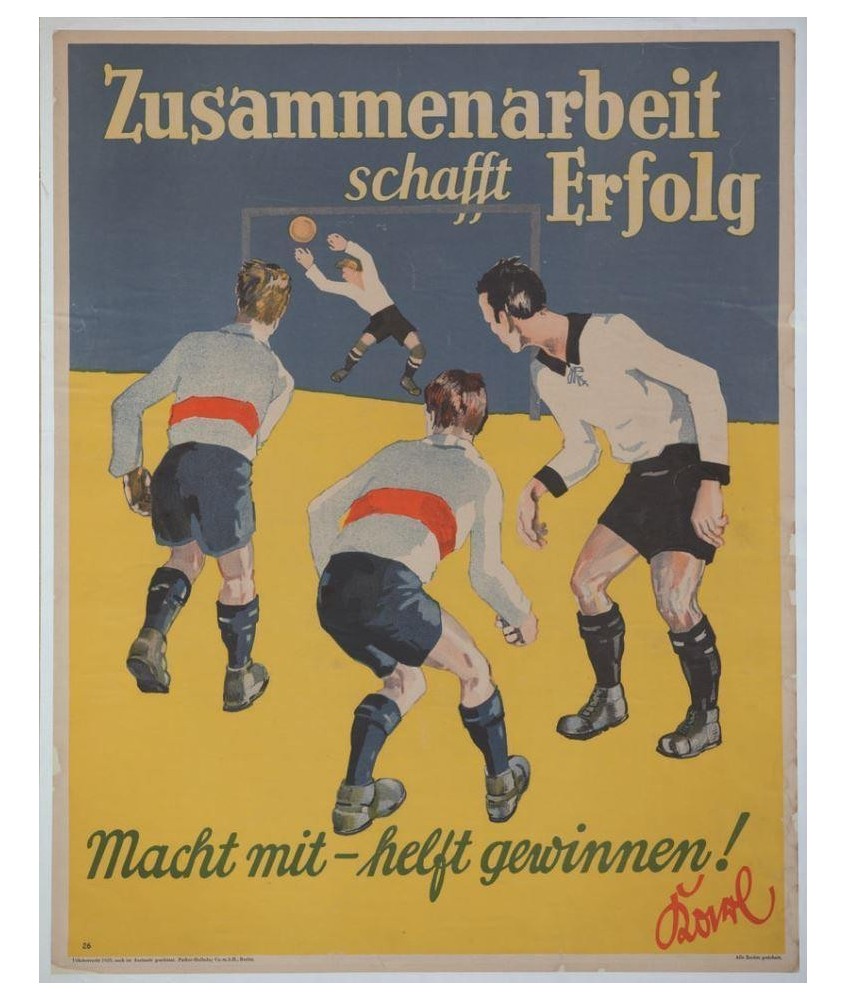


Two (now defunct) printing companies — Parker-Holladay Company and Mather & Co. — were at the forefront of this burgeoning motivation business. Both companies created a line of motivational materials that business owners could subscribe to (new posters and cards would arrive each month) and hang up and hand out in the workplace. The two companies hired some of the best illustrators of the day such as Willard Frederick Elmes and Hal Depuy to create these handsome motivational posters
CLASSIFICATION OF THE POSTERS ACCORDING TO THEIR CONSERVATION (in bold the one corresponding to this poster):
A+ Is a flawless example of a poster rarely seen in such fine condition.
A Designates a poster in very fine condition. There may be some tears on the margins, but not noticeable. No paper loss. Colours are fresh and has no blemish.
A- There may be some slight fold marks, tear or other minor defect, but most unobtrusive. Successful restoration if restored.
B+ If some restoration it is not immediately evident.
B Designates a poster in good condition. There may be some tears. Blemish or paper loss, but not in any crucial design area. Colours are fresh and the poster has a very good appearance.
B- Restoration may show some defects. Colours along the fold marks are faded.
C+ Restorations are visible.
C Designates a poster in fair condition. Tears, blemish, fold marks and or paper loss are more pronounced or may slightly affect the image of the poster. Colours may be faded.
C- Requires restoration.
Motivational posters…
This new, entrepreneurial definition of manhood reached a peak in the decade before the Great Depression. It was a time of idealism and optimism, and people were bullish both about the future of the economy and people’s ability to change their behavior and develop their character. Pithy maxims were popular (for example, Henry Ford was fond of saying, “Chop your own wood and it will warm you twice”), and it was felt that constructive encouragement could helps folks from any walk of life improve themselves. During this time, businesses began hanging beautifully illustrated posters with the same slogans that authors like Orison Swett Marden shared with readers a decade earlier. There were even trading cards with similar “go get-em” language that were handed out to employees like baseball cards. Business owners hoped that these posters and cards would help boost productivity and morale and inculcate uneducated and immigrant workers with the virile values needed to thrive in the world of business.
Two (now defunct) printing companies — Parker-Holladay Company and Mather & Co. — were at the forefront of this burgeoning motivation business. Both companies created a line of motivational materials that business owners could subscribe to (new posters and cards would arrive each month) and hang up and hand out in the workplace. The two companies hired some of the best illustrators of the day such as Willard Frederick Elmes and Hal Depuy to create these handsome motivational posters.
The Great Depression dealt a serious, if temporary, blow to the Self-Made Man archetype. With the crash in the market, and consequently in morale, the motivational craze fizzled, and the posters produced by Parker-Holladay and Mather & Co. became tattered ephemera that collected dust in antique stores and attics. Recently, however, there’s been a renewed interest in these unique pieces of 20th century history. Traveling exhibitions containing these vintage posters have criss-crossed the country and auction houses are selling them for thousands of dollars.
I can understand the appeal. The vivid artwork and graphic design is top-notch, and while the copy is sometimes ham-fisted, I actually find it inspiring as a man — perhaps because I’m still a believer in the self-made ideal. The advice is pretty timeless and just as applicable today as it was then. The posters teach the sort of stuff your grandpa would tell you: simple, time-tested principles, that if lived, can lead to a life of success.